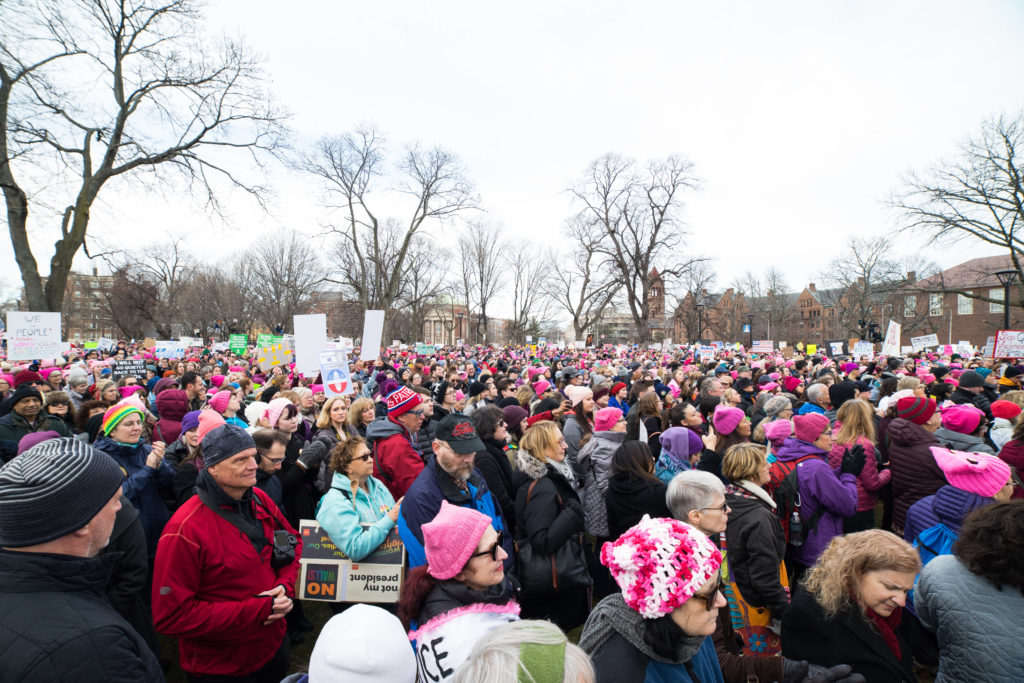From all walks of life, 10,000 take part in Women’s March
Cambridge police estimate 10,000 people came to Cambridge Common for the Women’s March. / Photo by Alex Melagrano.
January 21, 2018
A stream of people flows through the black metal gate at the Cambridge Common entrance. The human clusters are spotted with bright pink hats turned up at the ends, vaguely resembling a cat’s ears — “pussyhats” making a reappearance one year post-inauguration. From the gate, newcomers can hear the faint sounds of drums, trumpets and chanting rise from the center of the Common.
On an unusually warm late January day, an estimated 10,000 people gathered around the base of the Civil War memorial in an otherwise flat, grassy plain scattered with bare trees in anticipation of the Cambridge/Boston Women’s March. Despite varying age, race, gender and political lean, the protesters had at least one prevailing trait: “We have had enough.”
Who made it happen?
The Cambridge/Boston Women’s March, hosted on the anniversary of President Donald J. Trump’s inauguration, was organized by The January Coalition to mobilize resistors and recognize resistance efforts that have occurred in the past year. A group of social justice organizations formed the coalition to plan the march in alignment with their shared values, according to the event’s Facebook page.
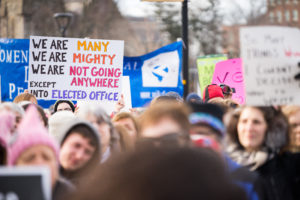
“This came together as a coalition of a lot of different local nonprofits and it’s been an absolute whirlwind because we didn’t really start planning until about a month ago,” said event organizer Esther Brownsmith, 35, a resident of Medford, Massachusetts. “One of the things that we were really committed to from the start is we wanted it to be as accessible and inclusive and broad as possible in order to get people out there to get them pumped up to do political work this year and change the world around them.”
The Cambridge Police Department estimated 10,000 people attended the rally, which filled their city’s Common. The January Coalition website reported the event didn’t take place in the Boston Common like the original Boston Women’s March — which saw more than 175,000 protesters — because organizers knew they would not be able to fill the space.
“It isn’t meant to replicate last year’s march,” the website read. Additionally, though “march” was in the event title to resemble the inaugural Women’s March for America, it did not include a march and organizers instead referred to it as a rally.
One event organizer, Sarah Block, is a 52-year-old Cambridge resident. Though the rally marked her first stint as an organizer, she has been politically active previously, and even attended last year’s Women’s March on Washington, D.C. She said operating in her hometown with a local crowd has been a friendly experience.
“One thing that was kind of nice is we came together with something like 10 organizations, we’re all volunteers, and people just sort of picked which committees they wanted to be on — made decisions democratically,” Block said. “We all kind of seemed to know what needed to be done and someone did it … It was very organic I would say.”
Who spoke?
Speakers included Cambridge Mayor Marc McGovern, Massachusetts Attorney General Maura Healey, State Representatives Marjorie Decker and Mike Connolly and Cambridge City Council members Denise Simmons and Sumbul Siddiqui. Northeastern professor Valentine Moghadam and Northeastern student Alex Burger-Roy also spoke at the event. U.S. Senators Ed Markey and Elizabeth Warren planned to speak, but were in Washington and unable to attend the event.
Absent from the speakers list was Boston Mayor Martin J. Walsh, who spoke at last year’s march. Brownsmith said they limited speakers to women “passionate in their work” and politicians who requested to speak. She was unaware of any request from Walsh.
The sun began to peek through the clouds as the first speakers kicked off.
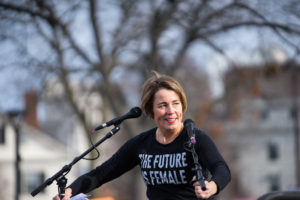
Healey, who referred to herself as “the people’s attorney,” took the microphone first. She referred to her 2017 Women’s March address and spoke about the American people’s achievements over the past year juxtaposed with the Trump administration’s failings.
“What he’s doing is unconstitutional and illegal,” she said, before initiating chants of “Time’s Up” that echoed across the Common.
Simmons, a City Council member and former mayor of Cambridge, talked about lifting up all women and refusing to allow Trump to turn the country’s progress around.
“We have come here not just to stand up, but to show up and show 45 he can’t do it here, he can’t do it now,” she said.
Alluding to the popular and moving song “Rise Up” by Andra Day, she continued:
“We’ve got to rise up against anti-feminism. We’ve got to rise up against anti-immigration. We’ve got to rise up against discrimination. We’ve got to rise up, and we’ll do it a thousand times again.”
Siddiqui, another Cambridge City Council member, continued the sentiment and celebrated the 5 million women around the world who rose up for the first Women’s March, and who called their representatives to ask for change.
“I am here because of the women who raised their voices in the voting booths this November,” she said. “We must organize, show up and fight for other people’s children as much as we fight for our own.”
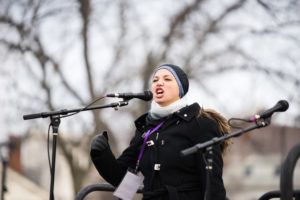
Moghadam, a Northeastern professor of sociology and international affairs and the director of the Middle East studies program, spoke about the needs of women in the Middle East.
“I was really focused on their needs for peace and security and stability and cooperation and development assistance,” Moghadam said in an interview with The News after her speech. “Those are the kinds of policies that will enable women in the Middle East to really realize their human rights, because otherwise … the women are in really bad shape. And they’re struggling and they’re working really really hard — and in some cases very effectively — for women’s equality, for women’s rights in some of the countries on the part of feminist organizations.”
Moghadam called for “concrete methods toward peace” in the region, including the end of weapon sales to Saudi Arabia.
“As Americans, we have a responsibility to make sure that our government’s domestic policies do not hurt American women, but also that American foreign policy does not hurt women around the world,” she said.
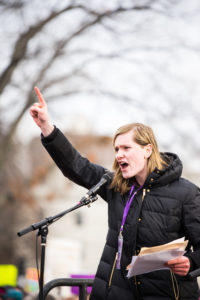
Northeastern was also represented by Alex Burger-Roy, a second-year chemical engineering major who spoke about her experience as a transgender woman and the additional challenges — and dangers — trans women face.
“Intersectionality should be the default,” Burger-Roy said. “We all need to stand together as women and fight for the rights of all women.”
While now the words “I am a woman” fall easily off her tongue, Burger-Roy said two years ago that was not the case. She said she didn’t go to the Boston Women’s March last year because she felt uncomfortable in women’s spaces.
“While my life can be hell, I wouldn’t have it any other way,” she said. “We must use all our power to stop more of this transphobic legislation.”
The speeches were broken up by performances, including ones by Vocal Opposition, a protest choir in the Greater Boston area that sings for progressive causes.
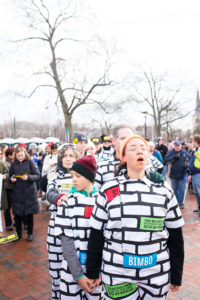
Elsewhere, a group of protesters called Brick X Brick moved amongst the crowd with linked arms, dressed in identical suits that featured white and black bricks. Their suits were designed to mimic Trump’s proposed Mexican border wall, and they pasted some of his inflammatory statements onto their bodies.
Domenella Green was part of the wall of people. Her sister, an IT project manager named Sherrie, supported her by handing out flyers detailing the group’s agenda.
“This is a response to the attack of liberties and the institutions we thought would last forever,” Sherrie Green said.
The wall stood quiet and unflinching as scores of protesters paused throughout the day to take photos and gawk at their demonstration.
The 10,000 onlookers included people from all walks of life.
They were parents:
The smallest attendees had the highest vantage point. Children were carried on their parents’ shoulders all across the Common, many eagerly waving signs they made themselves.
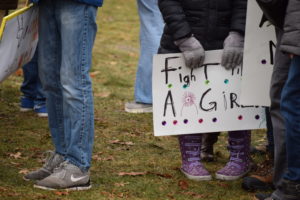
Elaine Hamilton from West Roxbury is a short, blond woman who brought her two daughters to the march. She said after the election she began attending protests and realized how important it is to be around other people supporting the same causes as she does.
“It’s not just enough to talk about it at the kitchen table,” Hamilton said, carrying one of her daughters on her back. “You have to stand up and do something. You have a voice and so you’ve got to use it.”
Chris Flygare, a social science researcher at a non-profit, held his 3-year-old daughter toward the back of the crowd. This wasn’t the first Women’s March for his daughter, Zoe, despite her young age: He brought her to last year’s march as well.
“I feel like I’m waking up every day to a nightmare,” said Flygare, a Somerville resident. “Trump and the Republicans are working against what I learned as a child made America great. They’re dividing people on ethnic lines.”
“Tell him what you tell Trump, Zoe,” he said to his daughter, who was bundled up in a puffy pink jacket.
“Go away, bad man,” said the toddler, first quietly, then louder and more confidently.
Zoe held a small sign that read, “Soon I’ll be in power.”
“It’s hard to explain to her what Trump represents, because she’s so young,” Flygare said. “When she sees him on TV, she can intuitively tell that he’s bad. She’ll say, ‘Daddy, there’s that bad man.’”
Sara and Alex Hartman brought their two-year-old daughter, Thea, with them from their home in Somerville. Sara, a teacher at the Massachusetts College of Art and Design, said she’s brought Thea to six or seven protests in the past year.
“I just want her to see that this is normal,” Sara said as Thea ran excitedly around an open area. “We try to teach her to have agency.”
Derek Etkin, a 36-year-old representative of the Democratic Socialists of America, also wanted his daughter to perceive peaceful protest as normal. He handed out stickers and pamphlets and spoke with passersby about ballot initiatives related to economic justice.
“I want it to be normal in our family to show up for other people when they are under attack,” Etkin said.
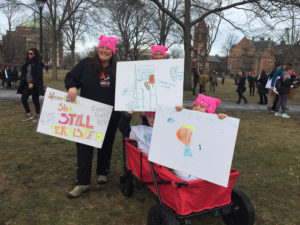
Elsewhere in the back of the crowd, where there was more space for little ones to move around, was a Grafton, Massachusetts family with three generations represented. Donna Williams, 69, stood next to her daughter Beth Williams-Breault, 39. Williams-Breault pulled her two children, 6 and 9, in a red wagon.
“It’s essential to not only be active, but involve your kids in things like this,” Williams said.
The family attended last year’s Women’s March on Washington, D.C., and spoke reverently of that march’s power and reach. Since then, Williams-Breault said there has been progress simply in bringing issues to light.
“Last year, it was like ‘Oh my god, Trump is president, what’s going to happen?’ and this year it’s like ‘Oh my god, what else is going to happen?” Williams-Breault said. “One thing that came out of this year is we’re learning just how much is wrong with the system.”
She also said she’s happy with the increase in women stepping up to run for public office and speaking out about sexual assault.
Williams is an environmental advocate, as is her husband. They feel the Trump administration’s environmental policies are “unraveling” their life’s work.
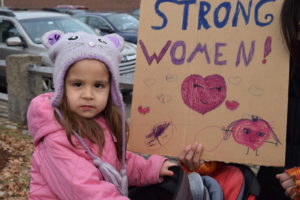
Erika Ramos, 43, held a sign protesting for equal rights while she corralled her two young daughters, Stella and Lulu. Ramos, a stay-at-home mom, is from Peru and resides in Cambridge. She also attended the Women’s March on Washington last year and was excited to bring her daughters to this year’s rally much closer to home.
“I brought them to show them how to fight for their rights, to show them how important it is to speak up for yourself,” Ramos said.
Lulu and Stella designed their poster themselves, adorning it with pink and purple splashes of color.
“We want our daughters to believe in culture and equality,” Ramos said.
They were educators:
Inga Schowengerdt, an adjunct professor of psychology at Boston University, came to the rally with a large group of protesters from the Newburyport Young Women’s Christian Association, more commonly known as the YWCA.
“My sign almost said, ‘Where do I start?’” Schowengerdt said.
Schowengerdt, who proudly wore a sign protesting Trump, said she was excited to honor the anniversary of last year’s Women’s March, having participated in the one in Boston.
“We’re here because of gender inequity, unequal pay, immigrants’ rights, you name it, it’s under attack,” Schowengerdt said.
Many educators attended the rally, blending into the sea of bright posters and pink hats.
Joanne Preston and her husband, John Burt, sat on a bench near the park entrance, quiet but proudly displaying a sign that read, “Make America care again!”.
The pair, who live in Arlington, are both English professors. Burt teaches at Brandeis University and Preston is retired. Preston is looking forward to the impact this movement will have on the 2018 elections.
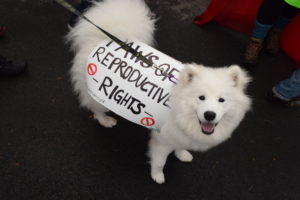
“Last year’s march was tremendously powerful,” Preston said. “The movement in the year since has been getting more women to run in elections. We need women to run for smaller offices for us to get women elected to the major offices. I think this will make a big difference in 2018.”
Burt said they were there to “show the flag” for women’s rights, and to oppose Trump’s policies on immigration.
Karen Jersild, a private high school teacher from Boston, attended the rally in a suffragette-themed outfit, adorned with a sash advocating for women’s rights.
“I’m trying to teach my students about advocacy,” said Jersild.
Jersild hopes that the rally will help show people that there is hope for equality, especially young women.
They were students:
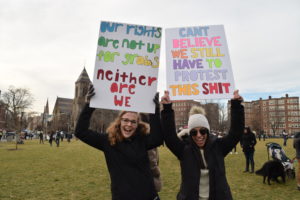
Katie Emberly and Katarina Rasidic, both first-year behavioral neuroscience majors at Northeastern, were excited to attend the rally and smiled as they waved their handmade, colorful signs.
“Honestly, we also came for the signs, they are really creative,” Emberly said. “And it also just goes to show how much is still wrong in this country.”
Rasidic said she felt empowered by the rally and that it made her feel inspired to protest even more. Emberly and Rasidic feel strongly about equality and hope that the rally will encourage change.
“I’d say just equality, whether it’s gender, ethnicity, or anything,” Rasidic said of the issues most important to her. “Just being able to have equal rights for everyone.”
Three first-year Boston University theatre students came out to the rally; they felt their studies were broadly aligned with the values being promoted by the event. Michael Rosegrant, a Fairfax, Virginia native, said a lot of the work they do in the theatre department relates to fighting oppression.
“We believe in supporting marginalized groups,” Rosegrant said. “In the last year I think we’ve become more aware of concepts like identifying white privilege and calling out white supremacy.”
Another BU theatre freshman, Arinze Okwoosah, stressed the importance of intersectionality.
“This isn’t just about white feminism,” said Okwoosah, who grew up in New Haven, Connecticut.
The third student, Selah Boughner, got one of her first experiences in social activism.
“Where I’m from, in Greenville, South Carolina, people don’t talk about this very much,” Boughner said. “Everyone there is complacent. So it’s cool to see so many people who are passionate about this.”
Another student from Boston University, Rachel Valpicello, 18, attended the rally to end the misconception that feminism is about pitting men against women.
“To support women, and women supporting other women, and men supporting women,” Valpicello said of her reason for protesting.
Chelsea Polk, a 22-year-old graduate student at the Massachusetts College of Art and Design, is skeptical of how much change has actually happened in the past year.
“Right after the inauguration, people were very upset,” Polk said. “But since then, the average person hasn’t done very much. I don’t know if a lot has changed. It’s only going to get worse, for the next few years, at least.”
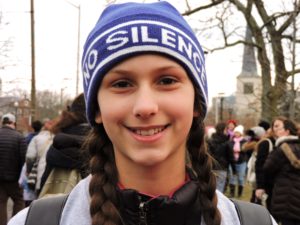
Kenza Wahman, an 11-year-old from Hull, Massachusetts, came to the rally with her aunt, Lisa Rounds, who lives in Marshfield. Wahman said she’s going to write about women’s rights for her school’s student paper.
“I’ve been to two other protests,” Wahman said. “The science march was my favorite. I’m really passionate about science.”
They were counter-protesters:
Close to 1:30 p.m., just as the rally was beginning, a group of counter-protesters began gathering on the street across from the park. Homer Franck, a member of Veterans for Peace, said they are exactly why his organization came.
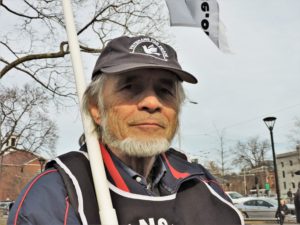
“We’re here today to keep the peace, because we’ve heard there might be some trouble from the alt-right folks, so we just want to get in between that,” Franck said. “We’re working with the peacekeepers.”
The peacekeeping team included members of the Cambridge police force and Women’s March organizers, who formed a ring around the small group of counter-protesters. The opposition to the rally represented various issues, including anti-abortion, anti-Marxism, conservative policies and anti-feminism. Many of them carried American flags and wore Trump gear.
A group of Women’s March protesters, separated from the counter-protesters by Veterans for Peace and the police, began shouting anti-Trump chants toward the Trump supporters.
Video by Hannah Bernstein, editing by Kaitlyn Budion
One of the counter-protesters, Nick Bacigalupo from Medford, Massachusetts, said he originally came to the March as a supporter of women’s rights. But he was critical of the left’s insistence on anger rather than dialogue.
“I have an easier time talking to Trump supporters than talking to people who don’t like Trump,” Bacigalupo said. “I lean left, and people that lean right seem to be more open-minded about having an open conversation.”
Another counter-protester, Michael, declined to give his last name. He said he came to the March as a supporter of women for Trump. He also said he supports the anti-abortion movement.
“We should be able to voice our opinions without being protested,” Michael said.
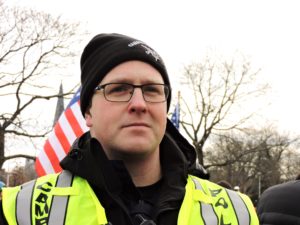
Other neon-clad policemen stood in groups of three or four along the edges of the Common and lined the streets to direct traffic. Among the counter-protesters was Officer Robert Ciriello, a 2007 Northeastern alumnus who has been on the Cambridge Crowd Control Force for almost three years.
“We try to give everybody the space that they need to say what they have to say. Unfortunately, we have to be in the middle sometimes,” Ciriello said. “I don’t know who’s behind me or who they represent. I’m here to protect everyone.”
Soon, as shouting between the groups grew louder, police moved the counter-protesters back across the street and they dispersed.
They were passionate:
Jess Gugino, a retiree living in Ayer, Massachusetts, attended the rally with a friend. She said they attended to voice their “general outrage” about the federal government.
“I hate Trump, I hate [Mitch] McConnell, I hate Paul Ryan,” Gugino said. “I don’t like to hate, but they leave me no choice.”
She had a cautious outlook on the 2018 elections.
“I’m hopeful, but not confident,” she said of the Democrats’ chances of retaking the House of Representatives or the Senate. “You never know what they’re going to pull out with gerrymandering. We can’t rest on our laurels. I want to be confident, but I’m not.”
The pair had a sign that read “My dog could do a better job,” complete with a picture of a dog and a picture of the president.
Some protesters carried signs and spoke out against Trump policies unrelated to feminism. Alan Meyers, a 67-year-old retired physician from Cambridge, held up a sign that read, “End Israeli Apartheid.”
“I happen to be Jewish. I think it’s a colossal mistake for Jews to make an ethnocentric state in Israel where Jews get more rights than others,” Meyers said. “There will not be justice in the Middle East until there’s justice for the Palestinians. People in the U.S. don’t get it.”
Meyers connected this to Trump’s recent decision to move the U.S. embassy from Tel Aviv to Jerusalem, which he said effectively rejects the two-state solution and legitimizes the oppression of Palestinians.
“It’s hard to understand why he did that,” he said. “For the U.S. to side with Israel is spitting in the face of Palestinian justice.”
Meyers criticized Trump for siding with Israel, a country that bars people who oppose the government stance from entering. This includes him, due to his work with Jewish Voice for Peace.
“What kind of democracy bars people with opposing views?” he said.
Elsewhere, a 32-year-old receptionist from Arlington named Laura Mandelberg sat alone on a bench with a sign in her lap that read, “Fatties against fascism.”
“We’re here in all shapes and sizes,” Mandelberg said. “All of our bodies are good bodies.”
Debbie Green, a 37-year-old nurse from the Boston area, carried a sign praising investigative journalism for its work. She said she has been very concerned by the Trump administration’s consistent attacks on the press.
“A free press is fundamental for our democracy, and I’m horrified by the debasement of it and, worse, the normalization of that,” Green said.
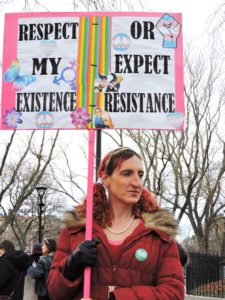
Kassandra Howard, 34, came to the rally to support LGBTQA+ rights. She specifically mentioned her concern over the Trump administration’s stance toward transgender individuals.
“There have been some absolutely atrocious acts by the administration against the trans and LGBTQ communities,” Howard said.
She has been an activist for a long time, volunteering with the Freedom Massachusetts campaign to defend a law supporting transgender rights that will be up for a public vote in November. Above all, she said she believes in unity, and that’s why she came to the rally.
“I want everyone to stay together and stand strong and love each other, regardless of who you are or how you identify,” Howard said.
As the march wound down, attendees streamed toward Harvard Square to catch their trains home. A crowd formed, and someone began playing “The Dancing Queen” by ABBA on a speaker. Eventually, after strangers sang and danced together a while, the crowd completely dispersed.
Video by Paxtyn Merten


